北京版小学英语二年级上下册知识点梳理 (1)
北京小学二年级英语知识点

北京⼩学⼆年级英语知识点英语学习是为了⾯对将来的全球化世界所必须要坚持的学习。
尤其随着中国的进⼀步发展,世界各地的⼈都会来中国从事,掌握英语可以让你在将来的交流中先于⼀步。
以下是⼩编整理的相关资料,希望帮助到您。
北京⼩学⼆年级英语知识点词汇学习:bin垃圾箱 park公园 road路 building⼤楼Shanghai上海 apple苹果 bird鸟 clean弄⼲净sweep扫 desk书桌 floor地板 where哪⾥live居住 love爱 use⽤ every每⼀个day天 keep保持复习巩固:please请 classroom教室 bicycle⾃⾏车 slide滑梯swing秋千 doll娃娃 ball球 balloon⽓球 point to指向词汇拓展:home家 the Bund外滩 tower塔举⼀反三:1.上海版⼩学英语⼆年级下册第⼀单元知识点:Clean the bicylce, please. 请把⾃⾏车弄⼲净。
2.Clean the classroom, please. 请把教室弄⼲净。
3.Sweep the classroom, please. 请把教室扫⼀扫。
4.Sweep the road, please. 请把马路扫⼀扫。
5.Where do you live? I live in Songjiang. I love Songjiang.你居住在哪⾥? 我居住在松江。
我爱松江。
6.Where do you live? I live in Jiading. I love Jiading.你居住在哪⾥? 我居住在嘉定。
我爱嘉定。
7.This is my mother. She is a nurse. I love my mother.这是你的母亲。
她是⼀名护⼠。
我爱我的母亲8.That is my father. He is a postman. I love my father.那是我的⽗亲。
北京版二年级全册英语知识点

二年级英语上册知识点总结Unit 11.句子:功能句型:1)This panda is old and fat. That monkey is young and thin.2)Do you like cats? Yes, I do. I like dogs ,too.3)There are so many toys here.These toys are so lovely.课文重点句:1) They are so cute.2) Look at the four baby cats.3) Look at those animals.2.语法点:1) be + 形容词2) Do you like…? Yes, I d o. 3) there are…4) 名词复数---- cats, dogs… 5) 冠词the3.词汇:动物:panda, monkey, bear, zebra, kangaroo, giraffe, pig, sheep, horse, donkey, rooster, hen, turkey, goose, dog, cat, tiger, elephant形容词:old, young, fat, thin,cute,lovely , cool数词:three, four, five, nine, eight,动词:go, see, look 4.语音:a, ey, ee, o, i ,er,Unit 21 功能句式:What color is your hair? It’s white. I have short arms and small hands. I have long arms but short legs. I am tall. 2语法点:a.名词的复数形式, legs arms, ears, eyes,不规则变化foot---feet。
b. 介词and和but。
北京版英语教材二年级上知识梳理
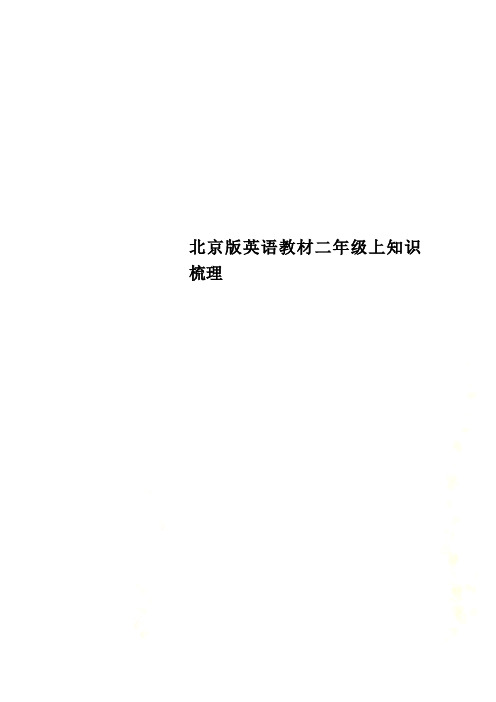
北京版英语教材二年级上知识梳理二年级上词汇及句型Unit one What day is today?话题:星期与活动词汇:星期:Weekends( Sunday, Saturday), weekdays(Monday, Tuesday, Wednesday, Thursday, Friday )打球: play ping-pang/…, 娱乐活动:go swimming/… .拜访看望某人:go to see my grandparents/ uncle/ aunt/ brother/ sister. 句型:1. What day is today? 今天星期几--It’s Tuesday. I play ping-pang today.It’s Saturday. Let’s go to see your grandma.2. What day is tomorrow?明天星期几—It’s Thursday. I go swimming on Thursday.注意:活动不同,表达方式不同go to see… , play …, go ….星期的词汇首字母大写。
Unit three What’s your number?话题:数字,询问对方号码词汇:1-20 one, two, three, four, five, six, seven, eight, nine, ten,eleven, twelve, thirteen, fourteen, fifteen, sixteen,seventeen, eighteen, nineteen, twenty. (十几词尾—teen, 几十词尾–ty,区分twelve12,twenty20)句型:1. What’s your number? --My number is twelve.Wha t’s his number? His number is eleven. (他的)What’s her number? Her number is twenty. (她的)2. How many pigs do you have on your farm? --I have sixteen pigs (on my farm). (复数)How many girls / boys do you have in your class? -- We have nineteen girls/boys.注意: 名词单复数变化,数量=1 单数表达,数量大于等于2复数表达,单词加s或es。
北京小学二年级英语知识点

北京小学二年级英语知识点一、单词拼读与语音1.1 英语音标在学习英语时,了解英语音标非常重要,需要掌握国际音标,并熟练掌握所有的音标发音。
1.2 字母发音掌握字母的发音也很重要。
在二年级,学生需要掌握26个英文字母的发音和大小写形式。
1.3 单词拼写学生需要学习基础的单词拼写规则,如音节重音和读音规则等。
二、基础语法2.1 词汇量在二年级英语学习中,学生要掌握基本的词汇量。
学生需要通过课堂、家庭和其他渠道来积累词汇,为以后深入学习做铺垫。
2.2 名词学生需要掌握一些最基本的名词,如人名、动物、食物以及物品等。
2.3 动词动词是语言的动力所在,学生需要掌握一些最基本的动词,如看、听、跳、奔跑、游泳、跳舞以及说等。
2.4 形容词形容词是为了形容名词而存在的,学生需要掌握一些基本的形容词,如好、坏、高、矮、快、慢等。
2.5 代词学生需要掌握一些基本的代词,如我、你、他、她、它以及我们、你们和他们等。
2.6 冠词冠词是指在名词前用来限定名词特指或泛指的词语。
学生需要掌握一些基本的冠词,如a、an、the等。
2.7 数量词数量词是用来表示事物数量或次数的词语。
学生需要掌握一些基本的数量词,如one、two、three等。
三、应用能力3.1 对话基础学生需要学习英语对话的基础,包括问候、自我介绍、问询以及表达想法等。
此外,学生还需要学会一些简单的交际用语,例如“请再说一遍”、“请在慢点说一遍”等。
3.2 短文阅读学生需要学习阅读简单的英语短文,理解短文的基本内容并回答问题。
3.3 写作能力学生需要学会进行简单句和段落的写作,例如自我介绍、描述周围环境以及介绍自己的家人、朋友等。
四、学习策略4.1 词语记忆学习英语,词汇量是非常重要的,学生需要掌握记忆单词的方法,包括组词、分类记忆等。
4.2 听力训练英语听力是英语学习的关键,学生需要进行听力功课,才能提高对语言的理解能力和应用能力。
4.3 参与活动学生需要参与英语活动,包括唱歌、朗读、演讲等,以此来提高英语应用能力。
最新北京版小学二年级英语全部知识点梳理.docx
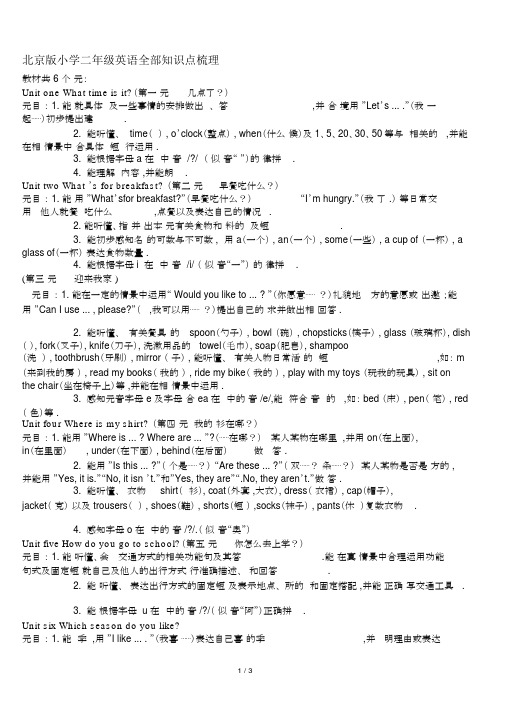
北京版小学二年级英语全部知识点梳理教材共 6 个元:Unit one What time is it?(第一元几点了?)元目: 1. 能就具体及一些事情的安排做出、答,并合境用”Let’s ... .”(我一起⋯⋯)初步提出建.2.能听懂、 time() , o’clock(整点) , when(什么候)及 1、5、20、30、50等与相关的 ,并能在相情景中合具体短行运用 .3.能根据字母 a 在中音 /?/ (似音“ ”)的律拼 .4.能理解内容 ,并能朗 .Unit two What ’s for breakfast? (第二元早餐吃什么?)元目: 1. 能用”What’sfor breakfast?”(早餐吃什么?)“I’m hungry.”(我了.)等日常交用他人就餐吃什么,点餐以及表达自己的情况.2. 能听懂、指并出本元有关食物和料的及短.3.能初步感知名的可数与不可数 ,用 a(一个) , an(一个) , some(一些) , a cup of (一杯) , a glass of(一杯)表达食物数量 .4.能根据字母 i 在中音 /i/ (似音“一”)的律拼 .(第三元迎来我家)元目: 1. 能在一定的情景中运用“ Would you like to ... ? ”(你愿意⋯⋯?)礼貌地方的意愿或出邀;能用”Can I use ... , please?”( ,我可以用⋯⋯?)提出自己的求并做出相回答 .2.能听懂、有关餐具的 spoon(勺子) , bowl (碗) , chopsticks(筷子) , glass (玻璃杯), dish (), fork(叉子), knife(刀子), 洗漱用品的 towel(毛巾), soap(肥皂), shampoo(洗) , toothbrush(牙刷) , mirror (子) , 能听懂、有关人物日常活的短,如: m (来到我的房) , read my books(我的) , ride my bike(我的) , play with my toys (玩我的玩具) , sit on the chair(坐在椅子上)等 ,并能在相情景中运用 .3.感知元音字母 e 及字母合 ea 在中的音 /e/,能符合音的 ,如: bed (床) , pen(笔) , red (色)等 .Unit four Where is my shirt? (第四元我的衫在哪?)元目: 1. 能用”Where is ... ? Where are ... ”?(⋯⋯在哪?)某人某物在哪里 ,并用 on(在上面),in(在里面), under(在下面) , behind(在后面)做答.2.能用”Is this ... ?”(个是⋯⋯?)“Are these ... ?”(双⋯⋯?条⋯⋯?)某人某物是否是方的 ,并能用”Yes, it is.”“No, it isn ’t.”和”Yes, they are”“.No, they aren’t.”做答 .3.能听懂、衣物 shirt(衫), coat(外套 ,大衣), dress(衣裙) , cap(帽子),jacket(克)以及 trousers() , shoes(鞋) , shorts(短) ,socks(袜子) , pants(休)复数衣物 .4.感知字母 o 在中的音 /?/.(似音“奥”)Unit five How do you go to school?(第五元你怎么去上学?)元目: 1. 能听懂、会交通方式的相关功能句及其答.能在真情景中合理运用功能句式及固定短就自己及他人的出行方式行准确描述、和回答.2.能听懂、表达出行方式的固定短及表示地点、所的和固定搭配 ,并能正确写交通工具 .3.能根据字母 u 在中的音 /?/(似音“阿”)正确拼 .Unit six Which season do you like?元目: 1. 能季 ,用”I like ... . ”(我喜⋯⋯)表达自己喜的季,并明理由或表达常做的事情 .2.能听懂、指认并读出表达四季的词和表达活动的动词短语 ,如: plant trees(植树) , go camping(去露营) , pick apples(摘苹果) , play in the snow(在雪里玩) .3.感受字母组合 ar 在单词中的读音 /a:/(类似发音“啊”)Unit Function Language and KeyLetters and sounds structure vocabularyUnit one Talking about time-What time is it?thirty to fifty a: bad, bag, cat, jam, van,-It ’s seven o’clock.o’clock apple, flag, glad, panda,-When do you go home?go home, get up,happy, hand-At five thirty.go to school, go to-What time is it?bed, go to the-It ’s nine twenty. It ’s drawing lessons,time to go to bed.watch the cartoonsUnit two Having meals-What ’s for breakfast?bread, milk, eggs,i: fish, dish, big, gift, river,-We have bread, milk,fruits, soy milk,king, six, film, it, singeggs, and fruits.noodles, fish, fried-Can I have fish and rice, a hamburger,rice, please? a hot dog, an egg,-Yes. Here you are.an orange, a glass-I’m hungry/thirsty.of water/juice/soy-Have an orange/ a glass milk, a cup of teaof water.Unit three Unit four Invitation and e: bed, pen, red, pet, get, asking for-Yes, we’d love to.the spoon,the neck, leg, desk, vest, jello, permission-Would you like to use glasses, the bowl,yellow, egg, elephant,the glasses?the chopsticks, the ea:head, bread-No, thank you.bathroom, the-Can I use the towel, the soap,bathroom, please?the shampoo, the-Sure. / Sorry you can ’t.toothpaste. Talking about-Where is my shirt?coat, cap, dress,o: box, dog, ox, fox, long, where the things-It ’s under the bed.shirt, jacket,clock, mop, top, hot are,-Is this your jacket?football, watchUnit five Unit six . Asking and-Yes, it is. / No, it isn ’t.shorts, shoes,telling ownership-Are these your trousers, sockstrousers?behind the sofa,-Yes, they are. / No,under the bed, inthey are not.the box,on the deskAsking and telling-How do you go to school, the u: hut, cup, lunch, nut, the way to travel school?cinema, the zoo duck, lucky, bus-I go to school by bus.by bus / bike / car-How does your dad go/ taxi / subway, onto work?foot-He goes to work by car.-Yes, he does./No, hedoesn’t.Talking about-How many seasons are season, year, hour ar: car, park, star, arm, seasons there in a year?spring, summer,card, party-There are four.autumn, winter-Do you like winter?go camping, play-Yes, I do. / No, I don ’t in the snow, fly alike winter.kite, pick apples-Which season do youlike?-I like spring. I can fly akite.。
北京版二年级英语下册知识点梳理
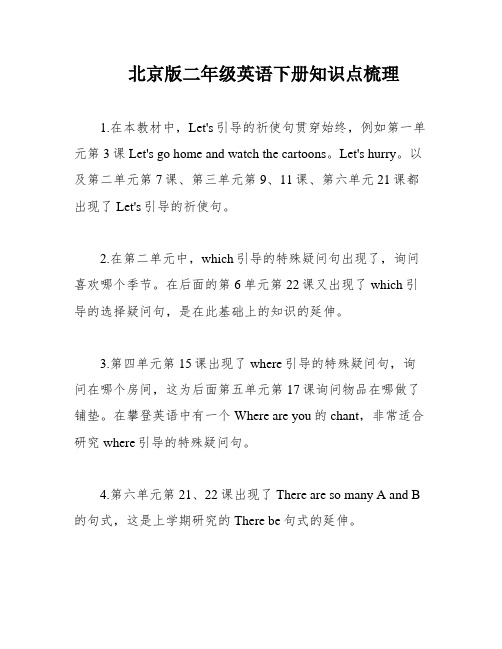
北京版二年级英语下册知识点梳理1.在本教材中,Let's引导的祈使句贯穿始终,例如第一单元第3课Let's go home and watch the cartoons。
Let's hurry。
以及第二单元第7课、第三单元第9、11课、第六单元21课都出现了Let's引导的祈使句。
2.在第二单元中,which引导的特殊疑问句出现了,询问喜欢哪个季节。
在后面的第6单元第22课又出现了which引导的选择疑问句,是在此基础上的知识的延伸。
3.第四单元第15课出现了where引导的特殊疑问句,询问在哪个房间,这为后面第五单元第17课询问物品在哪做了铺垫。
在攀登英语中有一个Where are you的chant,非常适合研究where引导的特殊疑问句。
4.第六单元第21、22课出现了There are so many A and B 的句式,这是上学期研究的There be句式的延伸。
5.第三单元第10课出现了Can I use…的句式,为后面第四单元第14课Can you give me…?打下了基础。
重点:1.本教材中的四会、三会单词分类包括:季节(夏天、冬天、春天、秋天)、自然界(花、草、叶子/树叶、天空、云)、家居(房间、卧室、浴室、厨房、客厅)、家居用品(桌子、椅子、电话、床、沙发、电脑、牙刷、肥皂、牙膏、洗发水、筷子、碗、刀、冰箱)、餐饮(早餐、午餐、晚餐、牛奶、茶、果汁、咖啡、豆浆、鸡蛋、米饭、鱼、饼干、豆腐、肉、面条、面包)、水果(橙子)和蔬菜。
2.重点词汇包括四会、三会单词,需要注意单词的拼写和发音。
3.句型方面,需要掌握Let's引导的祈使句、which引导的特殊疑问句、where引导的特殊疑问句、There are so many A and B的句式以及Can I use…和Can you give me…的句式。
4.在研究过程中,可以通过chant、歌曲、游戏等多种形式进行练,提高研究效果。
北京小学英语知识点总结2年级下册
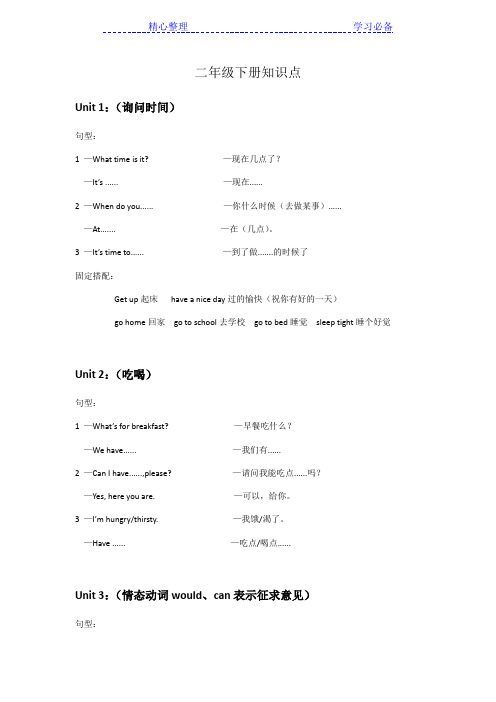
二年级下册知识点Unit 1:(询问时间)句型:1 —What time is it? —现在几点了?—It’s ...... —现在......2 —When do you...... —你什么时候(去做某事)...... —At....... —在(几点)。
3 —It’s time to...... —到了做.......的时候了固定搭配:Get up起床have a nice day过的愉快(祝你有好的一天)go home回家go to school去学校go to bed睡觉sleep tight睡个好觉Unit 2:(吃喝)句型:1 —What’s for breakfast? —早餐吃什么?—We have...... —我们有......2 —Can I have......,please? —请问我能吃点......吗?—Yes, here you are. —可以,给你。
3 —I’m hungry/thirsty. —我饿/渴了。
—Have ...... —吃点/喝点......Unit 3:(情态动词would、can表示征求意见)句型:1 —Would you like to......? —.你想......吗?—Yes, we’d love to./No, thank you. —是的,我们很乐意。
/不了,谢谢。
2 —Can I use.....,please? —我能用.....吗?—Sure./Sorry, you can’t. —当然。
/抱歉,不可以。
固定搭配:Over there在那边go ahead去吧wake up醒醒Unit 4:(物品归属、方位)句型:1 —Where is my......? —我的......哪去了?—It’s ...... —在......2 —Is this your......? —这是你的......吗?—Yes, it is./No, it isn’t. —是的它是。
北京课改版小学二年级下册-英语重点知识汇总梳理
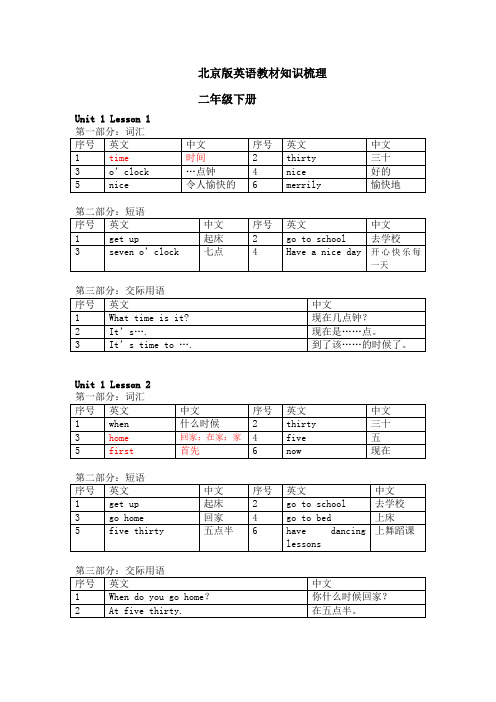
2. No, thank you.
不用了,谢谢。
Unit3 Lesson11第一部分:单词
1
bathroom
卫生间
2
call
打电话
3
phone
电话
4
towel
毛巾
5
shampoo
洗发水
6
soap
香皂
7
toothpaste
牙膏
8
want
想要
第二部分:短语
1
over there
在那边
中文
序号
英文
中文
1
dad
爸爸
2
for
为……所需
3
bread
面包
4
milk
牛奶
5
egg
鸡蛋
6
an
一,一个
7
fruits
水果
8
soy milk
豆浆
9
noodles
面条
10
baozi
包子
第二部分:短语
序号
英文
中文
序号
英文
中文
1
havebreakfast
吃早餐
2
have bread
吃面包
3
have milk
在床底下
4
behind the sofa
在沙发后
第三部分:句型
1. Where is my shirt?
我的衬衫在哪?
2. It’s under the bed.
在床底下。
Unit4 Lesson14第一部分:单词
1
this
- 1、下载文档前请自行甄别文档内容的完整性,平台不提供额外的编辑、内容补充、找答案等附加服务。
- 2、"仅部分预览"的文档,不可在线预览部分如存在完整性等问题,可反馈申请退款(可完整预览的文档不适用该条件!)。
- 3、如文档侵犯您的权益,请联系客服反馈,我们会尽快为您处理(人工客服工作时间:9:00-18:30)。
北京版小学英语二年级上册知识点梳理
Class:__________ Name:__________
Unit One: WHAT DAY IS TODAY?(第一单元:今天星期几?)
词汇: Sunday Monday Tuesday Wednesday Thursday Friday Saturday day week go I on in grandma uncle aunt
短语:play ping-pong/basketball/football go swimming/dancing/boating see grandma/uncle/aunt
句型:What day is today/tomorrow? It’s Monday. I play ping-pong .
I go swimming on Friday. Let’s go to see your grandma.
Unit Two:WHAT DO YOU DO ON SUNDAY? (第二单元:星期日你做什么?)词汇:park cinema bookstore museum zoo film class you we
grandpa
短语:go to the park/cinema/bookstore/museum/zoo/farm draw pictures read books go to see a film go to buy books go to see my
grandparents
句型:Do you go to the park on Saturday? Yes, I do./No, I don’t.
What do you do on Sunday? I go to the zoo.
Unit Three:WHAT’S YOUR NUMBER? (第三单元:你是几号?)
词汇:eleven twelve thirteen fourteen fifteen sixteen seventeen
eighteen
nineteen
句型:What’s your/Lala’s/Kate’s number? My/His/Her number is twelve.
How many pigs are there on your farm? I/we have sixteen pigs.
Unit Four:There are many animals. (第四单元:有许多动物。
)
词汇:big small fat thin elephant monkey cat dog baby toy these them
句型:Are there elephants in this zoo? Yes, there are four./No, there aren’t.
Do you like cats? Yes, I do. I like dogs ,too.
Unit Five:I HA VE LONG ARMS.(第五单元:我有长长的胳膊。
)
词汇:ear eye hair arm leg body hand long short small red me 句型:What’s this? It’s an elephant. It has big ears.
Is it small? Yes, it is./ No, it isn’t.
Do you have long arms? Yes, I do./ No, I don’t.
Unit Six:IT’S CHRISTMAS DAY.(第六单元:圣诞节到了。
)
词汇:thank old eight cake tree new year
短语:look at make a snowman/card sing and dance watch the fireworks
句型:Happy birthday to you. Thank you.
How old are you? I’m eight.
Look at the Christmas tree. How pretty it is!
Happy New Year! The same to you.
Let’s make a snowman. OK.
北京版小学英语二年级下册知识点梳理
Unit One: What time is it?
句型:What time is it? It’s seven o’clock.
It’s time to go to school.
When do you have your dancing lessons? A four thirty.
Unit Two: What’s for breakfast?
句型:What’s for breakfast? We have bread, milk ,eggs and fruits.
Can I have fish and rice, please? Yes, here you are.
I’m hungry./thirsty. Have an orange/a glass of water. Unit Three: Welcome to my house.
句型:Would you like to come to my room? Yes, we’d love to.
Would you like to use the glasses? No, thank you.
Can I use the bathroom,please? Sure./ Sorry, you can’t.
Unit Four : Where is my shirt?
句型:Where is my shirt? It’s under the bed.
Is it your jacket? Yes, it is./ No, it isn’t.
Are these your trousers? Yes, they are./ No, they are not.
Unit Five: How do you go to school?
句型:How do you go to school? I go to school by bus.
How does your dad go to work? He goes to work by car.
Does he come by taxi? Yes, he does./ No, he doesn’t. Unit Six: Which season do you like?
句型:How many seasons are there in a year? There are four.
Do you like spring? Yes, I do./ No, I don’t like spring.
Which season do you like? I like spring. I can fly a kite.。
